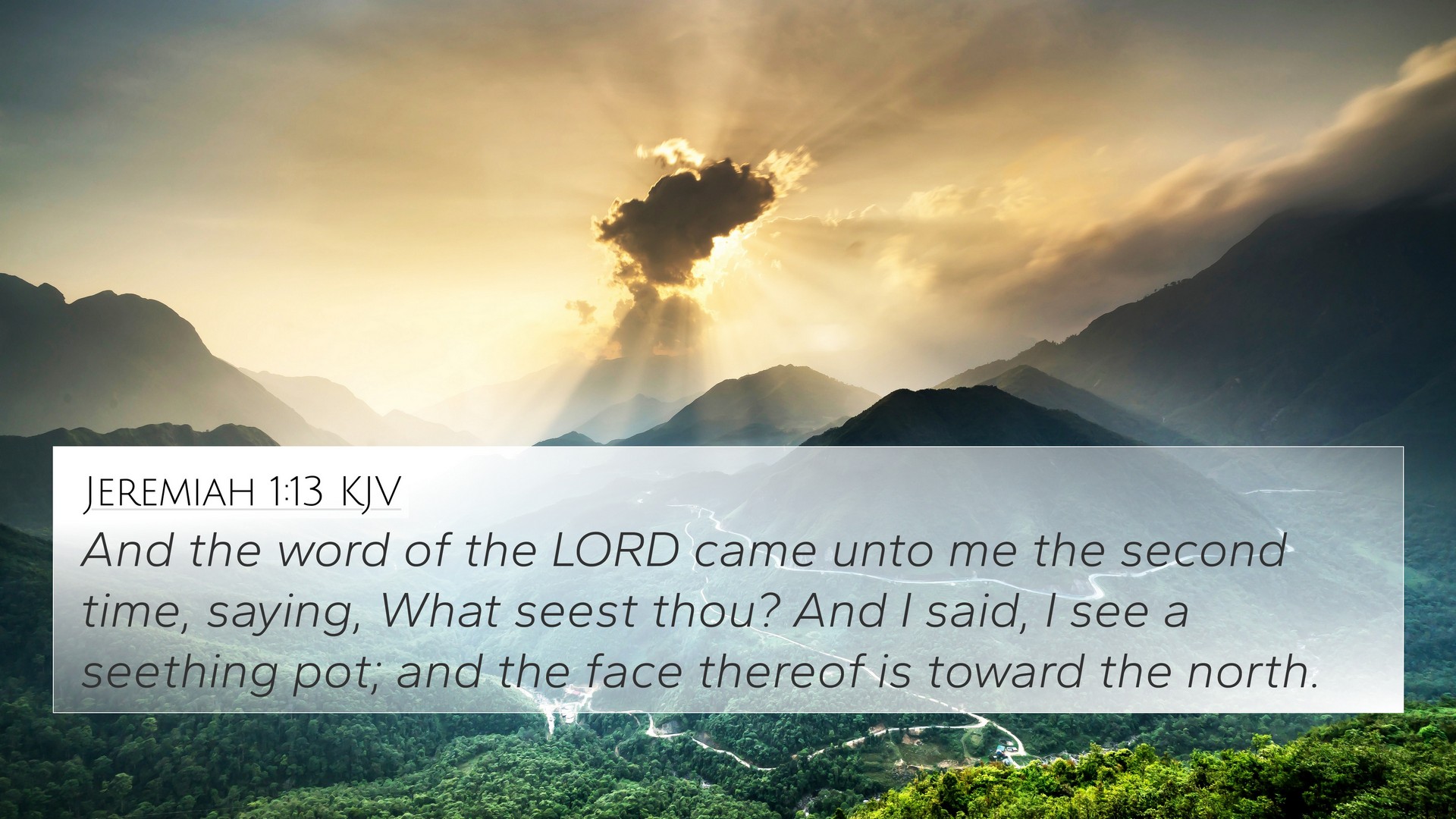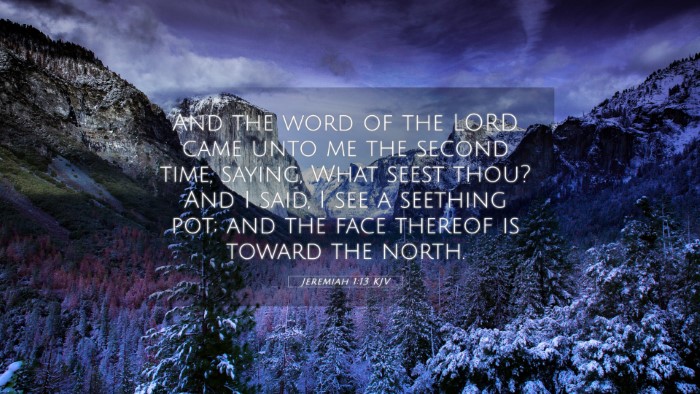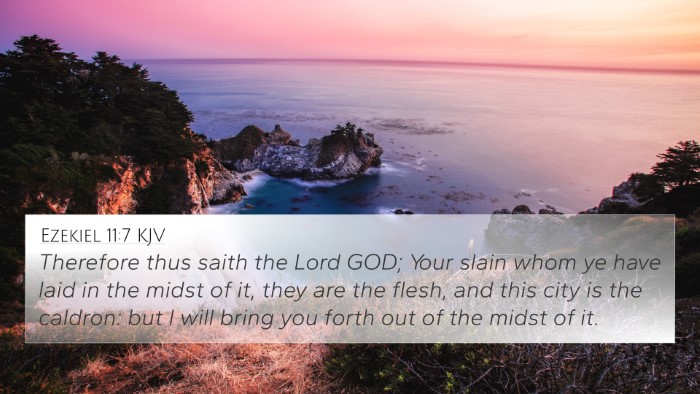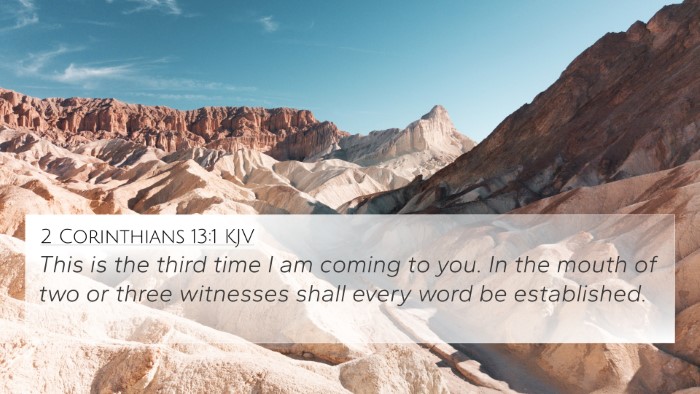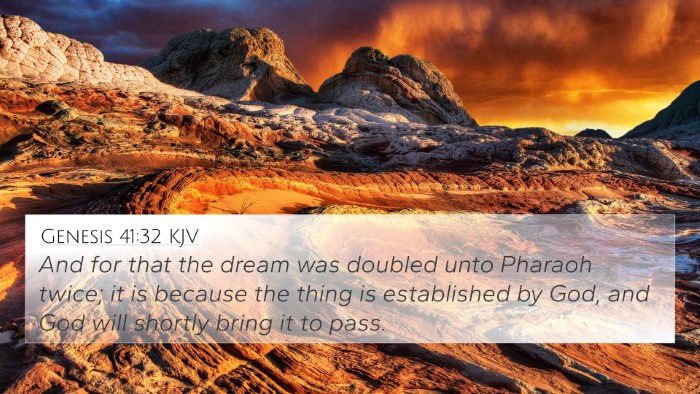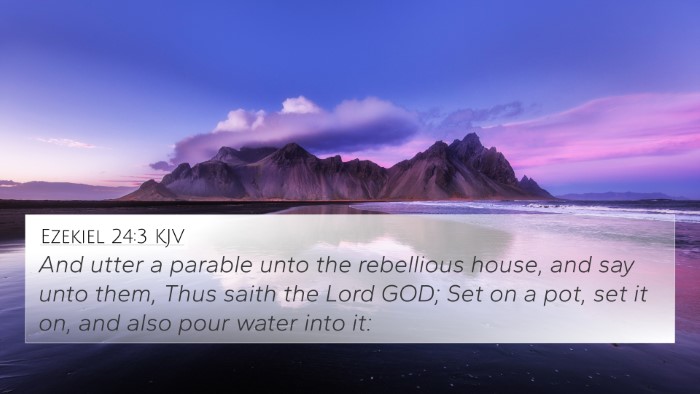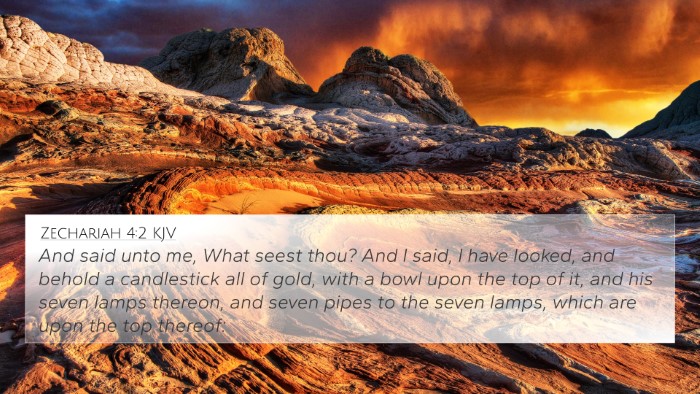Understanding Jeremiah 1:13
Bible Verse: Jeremiah 1:13 - "And the word of the Lord came unto me the second time, saying, What seest thou? And I said, I see a seething pot; and the face thereof is toward the north."
In this verse, Jeremiah describes a vision he receives from God. The imagery of the "seething pot" signifies impending judgment and turmoil that will pour forth upon the people. The direction toward the north hints at the origin of the judgment, which is often associated with the Babylonian invaders.
Commentary Insights
-
Matthew Henry:
Henry interprets the "seething pot" as a symbol of destruction. The pot is agitated and ready to spill its contents, signifying the calamity that would come upon Jerusalem. The north represents the Babylonians, emphasizing the urgency and severity of the impending divine judgment.
-
Albert Barnes:
Barnes notes that the vision serves as a warning. The boiling pot illustrates the unrest and strife about to inundate the land. His view emphasizes God's sovereignty in directing events, highlighting that the calamity serves a divine purpose, calling people to repentance.
-
Adam Clarke:
Clarke expounds on the figurative meaning of the pot. He suggests that this prophetic image indicates a prepared judgment that is about to be executed. The northern direction underlines the source of the coming adversaries and the symbolic importance of the pot is to show that judgment is not only a threat but an assurance of God's justice.
Connections with Other Bible Verses
Jeremiah 1:13 can be understood in relation to several other Bible verses that share similar themes. Here are some notable cross-references:
- Jeremiah 4:6: "Set up the standard toward Zion: retire, stay not: for I will bring evil from the north, and a great destruction." - This verse corroborates the theme of impending judgment from the north.
- Lamentations 2:4: "He hath bent his bow like an enemy: he stood with his right hand as an adversary..." - This passage reinforces the concept of God as a judge, bringing calamity.
- Ezekiel 1:4: "And I looked, and, behold, a whirlwind came out of the north..." - This prophecy similarly speaks to unsettling occurrences emanating from the north.
- Isaiah 14:31: "Howl, O gate; cry, O city; thou, whole Palestina, art dissolved: for there shall come from the north a smoke..." - Echoing the theme of destruction from the northern invaders.
- Amos 5:18: "Woe unto you that desire the day of the Lord! to what end is it for you?..." - This illustrates the dread associated with divine judgment, akin to the boiling pot's warning.
- Matthew 24:21: "For then shall be great tribulation, such as was not since the beginning of the world to this time, no, nor ever shall be." - This New Testament verse reinforces the continuity of prophetic warning across scripture.
- Revelation 21:8: "But the fearful, and unbelieving, and the abominable, and murderers, and whoremongers, and sorcerers, and idolaters, and all liars, shall have their part in the lake which burneth with fire..." - This reflects the eternal consequences of rejecting God's word and serves as a stark reminder of coming judgment.
Thematic Analysis
Jeremiah 1:13 fits into a larger narrative concerning divine communication and human response to God's revelations. It underscores several key themes:
- Divine Sovereignty: The verse emphasizes that God is in control of historical events and utilizes visions to communicate impending judgment.
- Call to Repentance: The prophetic warning serves as an appeal for the people to return to God and amend their ways before the judgment arrives.
- The Nature of Prophecy: The verse exemplifies how God communicates through visions, which are often laden with rich symbolism requiring discernment.
- The Consequences of Sin: Just as the "seething pot" overflows, sin leads to inevitable consequences — both for individuals and nations.
Cross-Referencing Biblical Texts
Utilizing tools for Bible cross-referencing can deepen one's understanding of scriptural connections. By exploring links between these verses, readers can engage in cross-reference Bible study techniques that illuminate deeper meanings.
How to Use Bible Cross-References
Engaging in cross-referencing allows readers to:
- Identify correlations and develop a thematic understanding of biblical teachings.
- Reinforce and confirm interpretations by connecting Old Testament prophecies with New Testament fulfillments.
- Enhance personal study with Bible reference resources and Bible cross-reference guides.
- Construct a comprehensive view of scriptural truths through Bible chain references.
Tools for Bible Cross-Referencing
There are numerous tools available for those seeking to delve into cross-referencing, including:
- Bible Concordance
- Digital Bible Study platforms
- Commentaries providing comparative Bible verse analysis
Conclusion
Jeremiah 1:13 stands as a compelling reminder of God's active role in human history, the significance of prophetic message, and the critical need for repentance in light of divine judgment. Understanding this verse in conjunction with various cross-references leads to a richer and more nuanced appreciation of the scripture as a whole.
Individuals studying the Bible can find great value in exploring these connections, allowing the Word of God to speak profoundly through its many layers of meaning.
